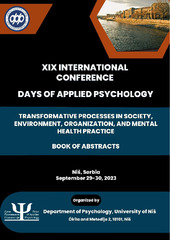| dc.contributor | Pedović, Ivana | |
| dc.contributor | Stojadinović, Miloš | |
| dc.creator | Jošić, Smiljana | |
| dc.creator | Videnović, Marina | |
| dc.creator | Krstić, Ksenija | |
| dc.date.accessioned | 2023-10-05T15:01:21Z | |
| dc.date.available | 2023-10-05T15:01:21Z | |
| dc.date.issued | 2023 | |
| dc.identifier.isbn | 978-86-7379-629-1 | |
| dc.identifier.uri | http://ipir.ipisr.org.rs/handle/123456789/965 | |
| dc.description.abstract | Peer Collaborative Problem Solving (CPS) can positively influence learning and
development, in different domains and at different levels of education. Studying collaboration
among adolescents is relevant for educational practice since it helps identify the conditions under
which collaboration might be productive as well as the ways teachers could support students’ CPS
in education. The aim of this systematic review was to identify and systematize research findings
on training and scaffolding modalities enabling adolescents to engage in productive CPS. Following
PRISMA guidelines we searched PsycInfo, WoS and ERIC databases and selected 5256 published
abstracts in English. Six researchers screened the titles and abstracts of all identified papers (2
researchers per abstract) and selected 160 fully published papers for reflexive thematic analyses.
Among 160 selected papers, there were 110 provided data on adult scaffolding or the contribution
of teacher/researcher support. The results revealed that the quality of cooperation training itself
was described in 17 papers (15.4%), while scaffolding was a much more common topic in the
selected research (N = 78; 70.9%). We also selected papers that included both training and
scaffolding (N = 13; 11.8%). Regarding the impact of this kind of support on collaborative problem
solving, the majority of published papers reported positive effects (N = 60, 53.6%) and only a few
of them found its effects to be negative (N = 7, 6.3%). The remaining 44 papers (40%) did not
analyse an impact of training or scaffolding. Our thematic analyses found that in efforts to
contribute to successful CPS, adults (teachers/researchers) can moderate peer interaction in three
ways, by focusing on either cognitive processes (N = 82; 75%), group discussions (N = 73; 66%), or
classroom management (N = 23; 21%). All characteristics that emerged in this review will be
discussed and concluding remarks will be focused on educational implications. | sr |
| dc.language.iso | en | sr |
| dc.publisher | Niš : Faculty of Philosophy | sr |
| dc.rights | openAccess | sr |
| dc.source | International conference days of applied psychology | sr |
| dc.subject | adolescence | sr |
| dc.subject | collaborative learning | sr |
| dc.subject | collaborative problem solving | sr |
| dc.subject | scaffolding of peer collaboration | sr |
| dc.title | Scaffolding peer collaborative problem solving: a qualitative systematic review | sr |
| dc.type | conferenceObject | sr |
| dc.rights.license | ARR | sr |
| dc.citation.epage | 63 | |
| dc.citation.spage | 63 | |
| dc.citation.volume | 19 | |
| dc.description.other | Book of abstract:19th International Conference DAYS OF APPLIED PSYCHOLOGY 2023; Transformative Processes in Society, Environment, Organization, and Mental Health Practice | sr |
| dc.identifier.fulltext | http://ipir.ipisr.org.rs/bitstream/id/3022/DAP2023-BoA_1-8,63,97.pdf | |
| dc.identifier.rcub | https://hdl.handle.net/21.15107/rcub_ipir_965 | |
| dc.type.version | publishedVersion | sr |

